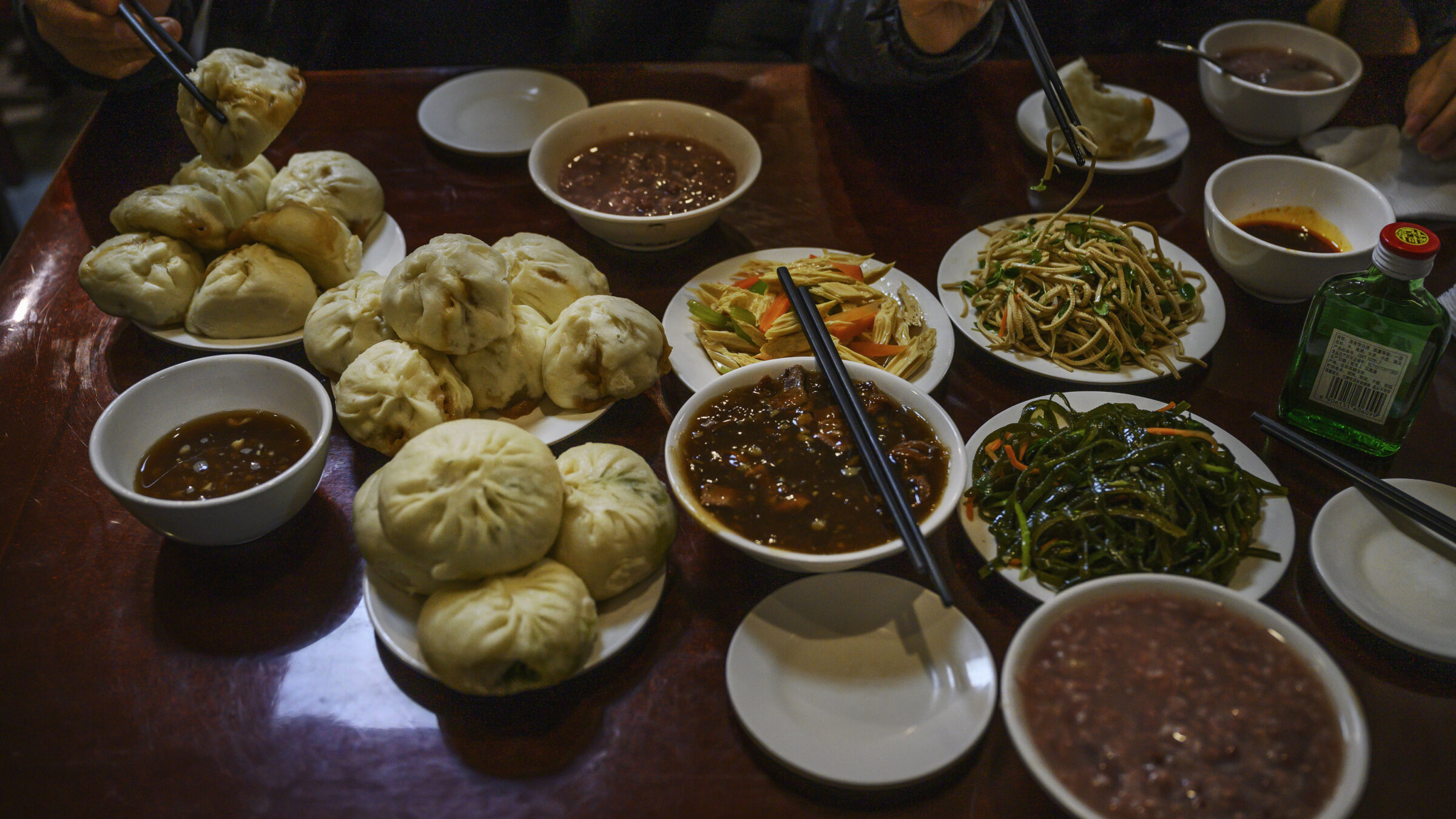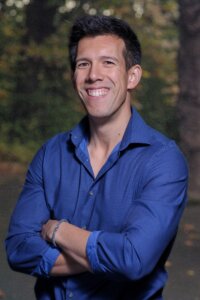As an Asian American Jew, I never felt like I belonged. Then I fasted for Yom Kippur in China
The Asian and Jewish sides of my heritage had far more in common than I could have ever imagined

Dishes of steamed buns, stew and other items are seen on the table at local restaurant Yaoji Chao Gan in Beijing, China, Nov. 9, 2020. Photo by Kevin Frayer/Getty Images
The first time I fasted for Yom Kippur wasn’t with my family or at synagogue, but in the small rural Chinese town of Taigu, 400 miles west of Beijing.
Anne and I were two of the six foreign English teachers at the university of nearly 20,000 students, and the only Jews for miles. When she brought up the idea of fasting for Yom Kippur, I was skeptical.
“What is that, like, not eating?” I asked.
A willful denial of food seemed unlike any Chinese tradition I could imagine. Fasting seemed both unbearable and also completely irrelevant. After years of disconnection from my Jewishness, I wondered: What did Judaism have to do with me?
As a mixed-race Jew, I had struggled with what it meant to be Jewish even more than with my unease at claiming my Chinese heritage. Instead of seeing my mixed-race identity as the opportunity to own the richness and complexity of two different traditions, I felt like an outsider in both spaces.
“You’re clearly not Asian enough for China,” Anne told me, over two tall bottles of Tsingtao. “So you might as well be Jewish.”
Faced with dwindling job prospects in the U.S., I accepted a two-year teaching fellowship in Taigu after graduating from college in 2009. China was one of the few places seemingly impervious to the fallout of the global recession. It also happened to be the ancestral homeland of my immigrant mother, whose family had fled during the Sino-Japanese War in the 1940s.
My childhood in New York was marked with traces of that lineage: lighting firecrackers outside my third-floor fire escape every Lunar New Year, burning colored paper at the gravesite of the Chinese grandparents I never met. But being mixed race means only ever having partial authority. Without speaking the language and having never stepped foot in the country, I knew there was a part of my Chinese family history I would never fully understand.
Before I left for China, I’d hoped that the whole experience would be a chance to finally come to terms with my identity. But in Taigu, there didn’t seem to be any outward confusion. Despite my best efforts at assimilating, I remained, simply, a foreigner.
My feelings of dislocation did not only apply to my Chinese heritage. My father, a secular American Jew, had never imparted much, if anything, about Judaism. I’d never had a bar mitzvah or studied a word of Hebrew. I envied my Jewish classmates less for their observance than for their abundance of school holidays every fall. Most of what I pieced together about my own history came from watching reruns of Seinfeld.
But the Asian and Jewish sides of my heritage had more in common than I could have imagined. Asian and Jewish Americans have made for unlikely bedfellows in the arc of American history: immigrant groups often distinguished for their work ethic, but also persecuted for standing out, made to bear the distinction and burden of immigrant success. In the 1990s, mainstream media outlets began going so far as to pronounce Asian Americans as the “new Jews.”
At times, Asian Americans and Jews have used this shared perception to forge alliances. An unexpected endorsement from the American Jewish Committee helped the Japanese American community secure reparations in 1988 to Japanese Americans who were wrongly interned during World War II. After the Tree of Life synagogue murders in 2018, numerous Asian American organizations publicly expressed their support for the Jewish community and condemned Jewish hate.
In my family’s two journeys to the U.S., I also saw the twining of these strands of my identity. My father’s grandparents’ escape from pogroms in Lithuania paralleled my mother’s parents’ expulsion from China. And yet, attempts at allyship have also been fraught. I rarely felt I had the right to be in majority Jewish spaces because of a presumption of what it meant to be “Jewish enough,” just as I sometimes struggled to fit in within the larger Asian American community because I didn’t cleave neatly to societal definitions of being clearly one thing or the other.
Counting down the hours until sunset during that first Yom Kippur, I was restless. I felt dizzy, lightheaded. Even my multivitamins started to look enticing. I cursed Anne under my breath. It was hard not to view the entire foray into Jewish culture less like an initiation and more like a hazing.
And yet, by the time Anne and I broke the fast, a kind of euphoria overcame me. I felt pride at having accomplished something I didn’t know I could do. More than that, I reveled at the permission to exert my own interpretation of a tradition that had, my whole life, felt off-limits to me. It was empowering to enact a piece of my identity, especially in a place where other parts didn’t feel as readily accepted.
At the start of my second year of teaching in Taigu, a new set of foreign teachers were hired to replace those who had left. Anne moved back home to the Bay Area, and I was now the only Jew on campus. I wanted to continue the tradition of fasting we’d started together, but the feeling of imposter syndrome returned. I needed a “real Jew” to show me how to do it.
The day before the fast, I reached out to a couple of Chinese friends to ask if they wanted to take part. They didn’t know all that much about Jewish customs, but they were interested in learning more. One told me that Yom Kippur reminded him of the Chinese phrase “to eat bitter.” He explained that “eating bitter” had nothing to do with food. It meant to persevere, to endure hardship, to sacrifice something without knowing what, if anything, will come of it in return.
Embracing this kind of uncertainty feels especially important today. Fasting puts me in a state that is otherwise nearly impossible to recreate in everyday life: I’m forced to live exclusively — and often painfully — in the present. The anxiety I felt around misrepresenting my cultural identity was tied to my fear of not knowing how I would be perceived by others. I realized that only by stepping out of my comfort zone would I ever be able to be comfortable in my own skin.
Individual identity is shaped just as much from one’s own self-perception as it is by societal acceptance. Celebrating multiracial Jewish identity is, at its core, about seeing each other’s shared humanity. It’s not that we always have to agree on everything. It’s that we commit ourselves to trying to understand one another — our histories, our stories, our beliefs — and try to find a throughline between them, even if, at times, it requires eating a little bitterness.
At sundown, the three of us broke fast at a restaurant in town: cucumber in tart vinegar, braised eggplant, pulled noodles stewed with chicken and potato. To my surprise, my friends wore the same look of relief and elation as I had my first year of fasting. For the first time, I saw that embracing one culture didn’t have to mean forsaking another. It didn’t matter how unlikely the occasion; both sides of my identity felt, to me, in perfect harmony. I was still understanding myself, and we were forging an understanding of how to live in the world together, bite by withheld bite.
















